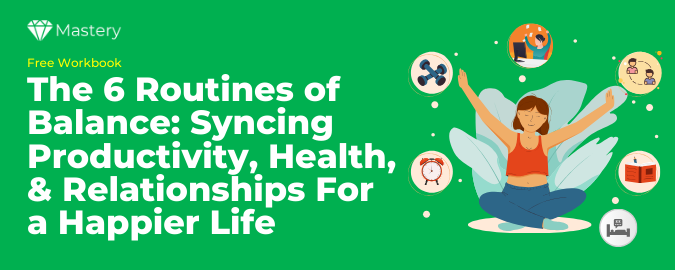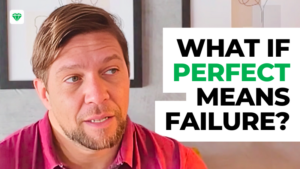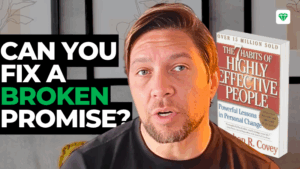
.
✅ WORKBOOK ACCESS: The 6 Routines of Balance: Syncing Productivity, Health, & Relationships For a Happier Life
Liten to the podcast version
Every habit you have is either your ally or your enemy—there’s no neutral ground.
The scary part? Most people don’t even know which side their habits are on.
In the book Atomic Habits, James Clear tells us that:
“Habits are the compound interest of self-improvement. The same way that money multiplies through compound interest, the effects of your habits multiply as you repeat them.”
Most people don’t fail because they aim too high. They fail because they drift—and they don’t even realize it.
So, how to be successful in life?
Give these five habits we’re going to see here a fighting chance to shape your identity—and they’ll take you to the future you can’t stop thinking about.
Habit #1: Adopt a Bias Toward Action
How to be Successful in life habit #1: Adopt a Bias Toward Action.
At some point, you’ve felt it—you knew exactly what needed to be done, but you didn’t act. You let the moment pass, knowing deep down it was a bad call.
If we have dreams, why aren’t we always moving toward them?
It seems obvious, right? We should pursue them relentlessly. But we don’t. So why not?
The answer lies in flow, a concept described by Mihaly Csikszentmihalyi.
“Flow is the state in which people are so involved in an activity that nothing else seems to matter.”
Flow happens when the challenges you face match your skills.
But the reality is, you can’t stay in flow forever. You will drift in and out of it, depending on how your skills and challenges align.
Every time you start something new, the challenge is greater than your skillset. You feel anxious because you don’t master it yet.
As you develop new skills, you begin to match the challenge, entering the flow state where you’re fully engaged and motivated.
But after some time doing that, your skills surpass the challenge. The task becomes too easy, and you fall out of flow, feeling bored and disengaged.
To return to flow, you need to add new challenges—push yourself further, set bigger goals, and step out of your comfort zone again.
Growing is not comfortable, it’s necessary.
This is the cycle of growth: anxiety, flow, boredom, and back to flow.
Each time you complete the loop, you become more skilled, more resilient, and more capable.
The key to mastering this cycle is taking action—no matter what. When anxiety creeps in, act. When boredom sets in, act. Don’t wait for the perfect moment. Act, adjust, and grow.
Tell yourself: I give results, never excuses!
Habit #2: Replace events with processes
How to be Successful habit #2: Replace events with processes.
In ancient Greece, athletes didn’t just daydream about standing on the winner’s podium.
They put in the work—thousands of hours of training, doing the same movements over and over, honing their skills, and building resilience.
That victory moment, with olive wreaths on their heads? It was just a spark in time.
The real magic happened in the process—in the sweat, the grind, and the quiet dedication nobody saw.
That focus on the process didn’t just create individual champions. It shaped how we push the limits of what’s possible.
Generation after generation, athletes have broken records and redefined what humans are capable of.
And that same mentality gave birth to the Olympic Games as we know today.
A global celebration of excellence, perseverance, and the pursuit of greatness, resetting the bar of what’s possible.
Success is a process, not an event.
A process is a group of actions taken in a long enough time.
Reading a book is a process. Learning a skill is a process. Solving a problem is a process.
An event is what happens at the end of a process. It’s instantaneous. Finished a book. Mastered a skill. Solved a problem.
Now, think about it. We live in a world obsessed with events.
Graduations, promotions, anniversaries—these are the moments we love to celebrate.
That puts all the focus on the finish line.
How can we think about the finish line without caring about the process of getting there?
It’s like staring at the peak of a mountain without paying attention to the climb.
The peak is only meaningful because of the climb.
Every step, stumble, and mistake is where the value is created.
Meaning, happiness, and fulfillment lie on the other side of discomfort.
Valuable things are difficult to attain because if they were not difficult to attain, they would not be valuable.
Without the climb, the peak is just a spot on a map. It doesn’t mean anything.
The people who succeed over the long run are the ones who fall in love with the process.
They don’t run to win medals—they run because they love to run.
They don’t write just to publish books—they write because they love the way ideas take shape on the page.
Joy is found in the doing, not just in the done.
If you want to be successful, recognized, and rewarded, don’t crave the event of being successful, recognized, and rewarded.
Crave the long enough process of building your success, recognition, and reward.
So, What’s the one process you’re willing to commit to?
It doesn’t have to be grand. It just has to mean something.
Whatever it is, make the process of doing it your goal, not the event that lies at the finish line.
The only difference between you and any highly successful person is time and effort.
You become what you repeat.
Habit #3: Learn as a Teacher, Not as a Student
How to be Successful in life Habit #3: Learn as a Teacher, Not as a Student
In the book The Seven Habits of Highly Effective People, Steven Covey suggests that we should learn something with the mindset of a teacher, not a student.
He suggests that…
If you learn something with the expectation of teaching someone about that subject within 48 hours, that imposes accountability on your learning.
That might seem like a small change. But as social beings, we tend to take better care of others than we do of ourselves.
That’s why learning as a teacher is so effective—it leverages this biological trend.
When you have to explain an idea to someone else, you’re forced to simplify it, find connections, and make sense of it in ways you wouldn’t if you were just trying to absorb the information for yourself.
As Einstein famously said:
“If you can’t explain it simply, you don’t understand it well enough.”
Teaching forces you to confront the complexity of a subject and break it down into simple, understandable parts.
That’s when you discover where your understanding is solid—and where you still have gaps to fill.
When you approach learning this way, it’s no longer about finishing a book or passing a test—it’s about building something solid within yourself and sharing it with the world.
You’re not just accumulating information—you’re building mastery.
So, here’s the challenge:
What’s one thing you’ve recently learned that you could teach right now?
Pick it, simplify it, and share it.
It doesn’t have to be perfect—just get started.
Because when you learn as a teacher, you turn understanding into influence. And influence grows when it’s shared.
Learn as a teacher, not as a student.
Habit #4: Know Instead of Understand
How to be Successful in life habit #4: Know Instead of Understand
One of the most important things you need to be successful at anything is to know things, but you don’t know the things that you don’t do, you only understand them.
To shift from understanding to knowing you need practice.
That practice needs to answer 2 questions:
- What do you want to know?
- What is the feedback you receive once you start practicing that?
The first question is an attempt to uncover your interest and the second question is an attempt to uncover your proficiency.
The combination of your interest and your proficiency is your passion.
Interest is when you look inward and find something that gives more energy than it takes.
Proficiency is when you commit to developing that interest over time, get positive feedback from the world, and become known for that.
Finding your passion is not an archeological dig. It’s an architectural build.
You don’t find your passion. You build it.
You can’t think your way into mastery. Understanding happens in your head, but knowing lives in your hands.
It’s the difference between reading about how to swim and jumping into the pool.
You can study all the theories, watch countless tutorials, and understand every stroke in detail, but until you dive in and experience the water, you won’t truly know how to swim.
No plan survives the battlefield. No theory conquers the trenches.
So, ask yourself this question:
What’s the one thing that you could be doing and you should be doing but you’re choosing not to?
The answer for this question is the one you need, not the one you want.
But but answering this question honestly, you will discover that you are so much more than what you like to hear.
Habit #5: Commit Without Conditions
How to be Successful in life Habit #5: Commit Without Conditions.
Success is not reserved for the talented—it’s reserved for the relentless.
If you’re waiting for motivation, convenience, or the perfect moment, you’ve already lost.
Most people negotiate with their effort.
They try hard—until it hurts. They stay committed—until it’s uncomfortable.
They show up—until something else demands their attention. And then they wonder why they never break through.
Success demands that you show up no matter what. No deals. No excuses. No negotiation.
You don’t need to commit when it feels good—you need to commit when it feels like hell.
Stop Hoping. Start Owning.
You already know what needs to be done. The only question is:
Are you willing to do it without complaint, without delay, without escape? If you’re waiting for certainty or comfort, you’ll never get started. If you’re waiting for the stars to align, you’ll be waiting forever.
There are no magic moments. There is grind. Every single day. Through exhaustion, through setbacks, through doubt. This is the price. And the ones who pay it—fully, unapologetically, without hesitation—are the ones who make it.
Success requires a mindset where failure isn’t a roadblock—it’s just the terrain.
There is no “try.” There is only doing, over and over again, until it sticks.
Burn your excuses. Burn your safety nets. Commit to this fully—whatever “this” is for you—or walk away. But if you walk away, you lose the right to complain about where you end up.
So, here’s the hard question:
Are you in, or are you out?
No more waiting. No more second-guessing. Decide now. And once you do, act like it. Act like there’s no way out, because there isn’t. It’s going to be brutal, and that’s exactly why it will matter.
Every great achievement in history was built on relentless, unshakeable commitment.
The only thing standing between you and the life you want is the story you’re telling yourself.
So change the story. Show up. Commit without conditions—and don’t stop until it’s done.
outro
And there it is—five habits, five ways to take control of your life and create something real. But knowing these habits means nothing if you don’t live them, breathe them, and act on them.
Adopt a bias toward action—because waiting gets you nowhere.
Replace events with processes—because mastery is built in the grind.
Learn as a teacher—because sharing is how you solidify your growth.
Know instead of understand—because action is the only way to turn ideas into reality.
Commit without conditions—because success belongs to those who refuse to stop.
No shortcuts, no excuses—just relentless, focused effort.
The path is yours. Now walk it.




